2016 Bodley Head/FT Essay Prize winner: Cash and curry
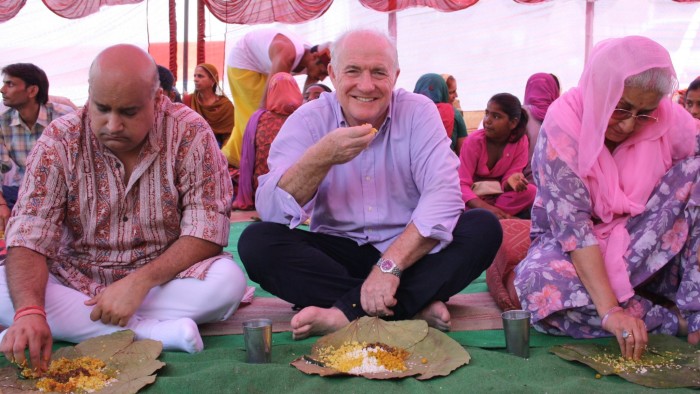
Simply sign up to the Life & Arts myFT Digest -- delivered directly to your inbox.
In the restaurant’s messy garden, just back from the beach, a fibreglass idol of Michelangelo’s “David” stands on a grubby white plinth on which the words “tsunami memorial” have been painted. Underneath them is daubed a skull and crossbones and the date “December 26 2004”. Red-skinned and, because this is India, his modesty covered by a sarong, this David looks more like a beach bum surfer who has been horrendously burnt.
It’s the kind of sinister memento mori that might scare off a less committed traveller. But I am a pilgrim to this place, the road here has been long and the idol feels appropriate; it lends the restaurant a temple’s air. The owner sits at a table, alone, staring at a group of fishermen as they try to untangle their netting against the uncooperative wind.
It seems absurd but, even now, with my goal in sight, it could all go wrong. A money crisis is sweeping India. Prime Minister Narendra Modi has recently taken the country’s two highest banknotes out of circulation — a strike at black money and corruption which eviscerated 90 per cent of the country’s physical cash. The upshot of this is that I have no physical money on me. And this restaurant, hardly more than a shack, does not look like it has a card machine.
Still, the owner welcomes me like he knew I was coming. He gestures for me to sit, then stares at me over his chin, with the whites of his eyes. “We were visited here by British television company,” he says before I even manage a hello. “You have heard of The Rick Stein?”
“I have,” I say, which is something of an understatement.
***
We seldom choose our gods, so perhaps I shouldn’t be surprised that a TV chef ended up as one of mine. Not that I recognised him for a deity on our first encounter.
‘I knew it was something I had to write about’
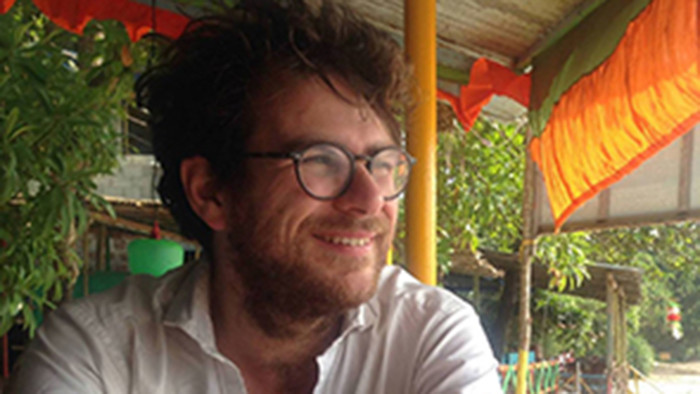
The 2016 Bodley Head/FT essay prize attracted hundreds of entries from young writers around the world. The competition, in its fifth year, aims to discover new talent in long-form, non-fiction writing.
The five-strong judging panel, including the historian and FT contributing editor Simon Schama, chose Chris Newens, 30, who is based in London and Paris, as the winner of this year’s prize. He says: “I was fastidious about keeping a journal everywhere I went in India but the idea of doing a piece about how I’d structured the trip hadn’t occurred to me. Then the demonetisation crisis hit India . . . and I knew that it was something I had to write about. But it was only in Madurai, where I learned about the Hindu belief that the spirit of gods are maintained in idols through worship, that I began to see a link with the money and my Stein pilgrimage.”
Alec Russell, FT Weekend editor and one of the judges, says: “Newens was the undisputed frontrunner in an eclectic field of subjects and styles.”
The essay will be published as an ebook, Lesser Incarnations, by Bodley Head, as will the two runners-up: Stranger in a Strange Land: 100 days in the Credit Analysis Department of an Indian Bank by Abishek Mukherjee and Checkmate or Top Trumps: The Geopolitical Game of the Century by Daniel Rey.
It was midnight, somewhere above the Malay Archipelago, when we hit turbulence: bladder-testing, soul-searching turbulence. I was lurched from a half-sleep into a juddering cabin and the muted soundscape of airline panic.
I was on my way back to London from Australia, leaving behind my ultra-long-distance girlfriend, my relationship with whom I had flown half way around the world to salvage, and managed to do so just enough that I now felt simultaneously upset about leaving her and still trapped in a hopelessly doomed romance; and now I was going to die. With physical escape not an option, I could hope only for a mental one, into the sunniest recess of the in-flight entertainment system.
The concept behind Rick Stein’s India is fun, though hardly groundbreaking. Stein — whom I was dimly aware of being a chef famous for Cornwall and fish — tasted, cooked and sweated his way from the top of the subcontinent to the bottom. He headed behind the scenes of kitchens in luxury hotels and street-side shacks; he offered titbits of history and observation about India and its food.
No doubt Stein’s a better-than-good cook but his onscreen presence has a kind of anti-charisma: his sentences are a tangle of both internal contradictions and tautologies, all delivered with a studied drone. How, I marvelled, did such a middle-aged, bulbous-featured, monotonous-voiced man ever score a gig as a television presenter?
Over the next six hours, in that suggestible state between waking and sleep, sucking on recycled air, with few other external stimuli, I watched all six episodes in the series. And when the six episodes were over, I watched them again.
Rick Stein’s India had worked on me a kind of magic. Partly it was the bright colours, the imagined flavours, the implied sense of escape. But more than that, it was what I began to see as Stein’s endearing humanity and his absence of polish. In the face of TV cameras, he was often lost for words, he was more than happy to make half-educated guesses, he was so excited by everything he tasted, he was refreshing and different. He captured a combination of ignorance and wonder that is genuinely felt when you travel.
Stein was not trying to improve my confidence or get me to give up smoking; he was just showing me India and Indian food, again and again and again. The closest he got to any form of take-home message was the strangely self-evident catchphrase that he repeated in episode after episode as though it contained within it some essence of divine truth: “When you want to have a curry, you have to have a curry.”
***
Hindu pilgrimages often involve an act known as darśan: or looking into the eyes of your god. Before we have discussed whether I will be able to pay, the restaurant owner gives me the opportunity to attempt this.
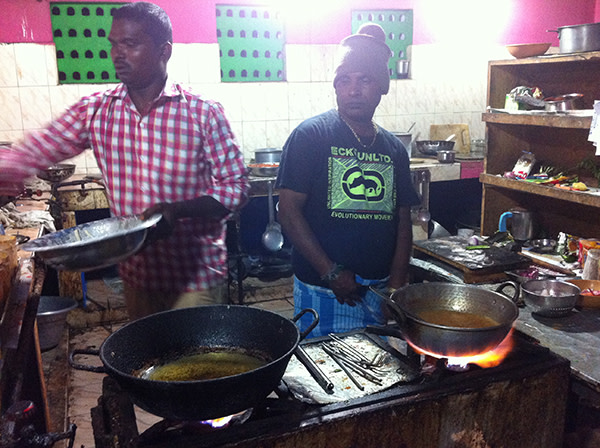
Head still tilted back, his hands sweep across the table to locate his phone. Playing on the screen, a sitar chime strikes from the phone into the salty wind. It accompanies a long-distance shot of the very stretch of beach on which I am sitting, though on a much nicer day. There are the same colourful fishing boats and fishermen, the same vicious rollers that break on to the same dirty sand, the same listless cows, chewing the same cud.
Then a monotonous and intimately familiar voice announces over the imagery: “I was told about an ancient 8th-century temple in the town of Mamallapuram . . . but always being a bit peckish, I headed straight for the restaurants on the beach instead.”
In the clip Stein is every inch the pasty holiday-making everyman, walking down this very beach and mounting the very steps into this very restaurant. A couple of cuts later, he sits in front of a steaming fish curry and takes a mouthful.
“You know when it’s dead fresh fish like that. Ah, heaven!” Stein exclaims. “And the tamarind just gives it such a zest. And the curry leaves, and of course the green chillies in it. It is superb!”
“Would you put that on the list of best curries?” a disembodied voice asks from off camera.
“Would I!? I mean, seriously, for me, and I think I’m a bit biased, I have to say, but fish curry like this,” he gives a strange grin, and zigzags his index finger back and forth in the air, before pointing toward the ceiling.
***
I have been following in the footsteps of Rick Stein, eating where he ate, across South India. Now, at the culmination of my trip, I have reached the restaurant that served the best curry of his travels.
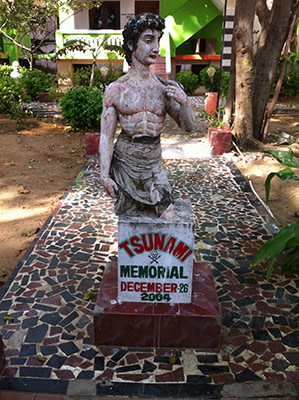
The trip was not a pilgrimage when I set out. Initially, following Rick Stein’s journey was just a fun way of planning a holiday. But India has a way of intensifying relevance and, in a country of more than a billion people, you seldom find yourself alone for long.
My conversion to more magical thinking began on a train to the holy town of Madurai, which left from Sengottai Terminus, deep in the Western Ghats. A cool dusk was falling outside the iron-barred windows.
The train continued down on to the plains of Tamil Nadu — dark now, save for twinkling towns in the distance, loomed over by temple pyramids — and at some point I began talking to a giggly yet serious man opposite me. He could have been as old as 40 but for a wispy, pubescent beard. His long neck and delicate fingers gave the impression of someone thin trapped inside a fat man’s body. He was called Anwar, but I can only think of him by his brother’s name, which was Ganesh.
***
“So, you want to eat Rick Stein’s best curry in India?” the restaurant owner asks me and chases the question with a high-pitched laugh.
“Yes,” I say. “The only thing is” — here it comes — “I don’t have any cash.”
The owner laughs again, though without mirth, and the wind continues to blow thick in my face, the waves to pound at the shoreline: the grey sky puts me in mind for a moment of the English coast; of Cornwall, say.
“Do you have a card machine?” I ask.
The owner stays silent. He is watching a fisherman walk up the beach to the restaurant, a large silvery red fish swinging from his hand: I recognise it as a red snapper, the meat of Stein’s fabled curry.
Without a word, the fisherman strides up to us, lays his catch on the ground, and waits for the owner to suggest a price.
“No card machine,” the owner tells me.
My heart sinks: to have come so close!
“There is an ATM in town. It’s working but the cash will be gone again soon,” he says, before turning to the fisherman to begin haggling over a price.
***
“You believe the statue is Ganesh?” I asked Ganesh.
We were in Madurai, in the town’s sprawling Mīnāksī Temple, in front of a vast idol of my friend’s divine namesake. Carved from a single black stone, framed in gold, and garlanded by linen and flowers. This Ganesh idol certainly looked like my idea of a god: heavier than the world and staring into me with abyssal eyes.
“For me, yes, I do believe Ganesh is the statue,” my friend said. “Because I believe he is.”
Such circular logic was pure Stein, and I liked it, even if I was not quite sure what it meant.
“Belief and veneration put god in the statue,” Ganesh said. “By feeding him, dressing him, treating him as though he is alive, he is there.”
His meaning took a moment to settle, and I realised I was thinking of Stein again. Wasn’t my journey in his footsteps a kind of veneration? Didn’t I believe the proclamations on food that he had made? Did I not . . . want a curry?
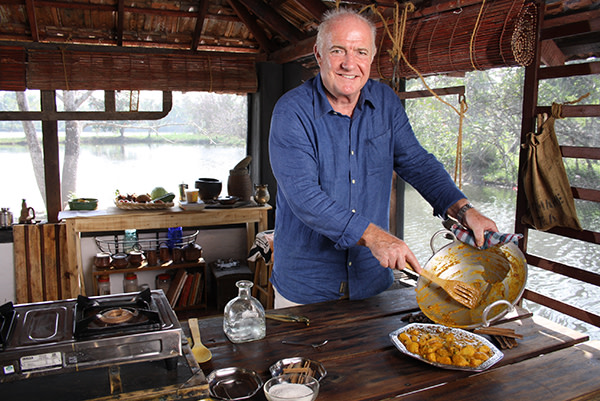
From the deity-teeming stories of temples to the extraordinary worship of politicians I’d seen in Tamil Nadu, the Hindu pantheon did not seem that exclusive a club. If gods are made by belief, why couldn’t I add Rick Stein to their number?
This was a personal revelation — Stein a personal god — and Mīnāksī was not the place to burden Ganesh with such amateur Hindu theology. Instead, I followed him into the temple’s main hall, where my attention was focused by just one worshipper, a skeleton-thin woman, grimacing prayers to a supple, dancing incarnation.
She removed an old, no longer valid, Rs500 note from the folds of her sari and laid the worthless paper on the idol’s donation box, smothering it flat with bony hands. Still praying, she folded the note once, then twice, then three times, then fed it slowly into the box. Others came to give respect to the idol, but still she lingered. She still had her eyes on the god when Ganesh and I turned to go.
“Probably, she was a woman with a mattress fortune,” Ganesh proclaimed to me later as we shared hot chai at a roadside stall outside the temple. “I mean, her life savings were in cash, in Rs500 and Rs1,000 notes. After Modi’s law she would have lost half her money.”
“But wouldn’t it offend the god?” I asked. “She gave money that isn’t worth anything.”
Ganesh stroked his fat chin with a slender hand.
“If she has a mattress fortune,” he said, “what would she pray for, apart from that her money be real again? If Shiva answers her prayers, the offering becomes real.”
I must have looked unconvinced, because he continued.
“And if she truly believes, then she believes that Shiva will listen to her, so the money is already real. What gives money value? You can’t eat it! Money is valuable because we believe it is.”
“So . . . ” I supped the last of my chai, “you mean money is like the gods?”
“And Modi has slayed the two biggest incarnations!” Ganesh giggled at his own pun. “Perhaps.”
***
On the dusty back streets of Mamallapuram, past the tourist shops and the idol carvers, I discover a working ATM. It has a long queue of devotees outside it, preparing to do darśan.
The whole queue wants to talk to me. Though not, as normal, about demonetisation, but rather — I almost can’t believe this — about Rick Stein. “He said a restaurant in Mamallapuram does the best curry in all of India,” a skinny man in front of me says. “Very good for the town, very good for business!”
“Oh yes,” the man in front of him agrees, “many give thanks to the Rick Stein here.”
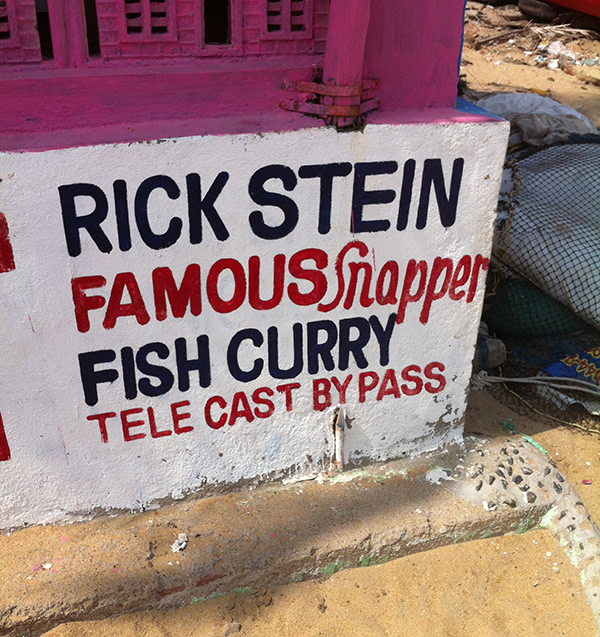
And why not? Just by coming to the Mamallapuram restaurant and by uttering a few phrases, Stein has blessed the town; provided it with years of plenty. Belief in him, like belief in money, manifests real effects.
After more than an hour, I reach the cash machine, which works, but agonisingly slowly, like it’s been exhausted by so many worshippers. It distributes a crisp Rs2,000 note: the first one I have seen.
***
I am invited to watch Stein’s best curry in India be made. Night has fallen and a greasy ghee moon sweats over the ocean. The owner is also the chef, and the stove flame blasts viciously hot, whipped up by the salty wind — seasoning direct from the Bay of Bengal — that blows in from the open door.
I ask the owner if he will tell me where the recipe is from. I expect a tale of old fisherman’s secrets. Instead, he explodes with trademark, high-pitched laughter. “Curry comes from recipe on the supermarket spice pack,” he splutters.
He throws in tamarind, mustard seeds, coriander: even while I am trying to make sense of this “best curry in all India” being partly the result of default masala instructions, I cannot believe how fast it forms. From start to finish takes less than five minutes, and I am being gestured outside, seated at a table in the warm, blustery night, food about to be served.
Perhaps the curry’s very ordinariness is the ultimate evidence of Stein’s godliness, I muse — his words have anointed the most straightforward of things.
But then, the dish arrives and another darśan begins. The sauce is the colour of a fast sunrise, in its rough texture I can see whole spices, capsules of the hinterland, and the fish itself seems to palpitate, as if from an impossible thrill at its own flavour; this, combined with the moon, the wind, and the curry’s enigmatic creator, tells me what I already knew: there is nothing ordinary here.
The curry is as much my god as Stein, I realise, and both are lesser incarnations of something more intangible: love of food, desire to travel, the power of belief.
When your god is a meal, darśan cannot be performed only with the eyes. (A more Christian than Hindu sentiment but, in the moment, it feels true.) I raise my glass of beaded, extra-strength beer to toast Rick with the air. Then I fill my fork and take a bite of the best curry in all India.
Photographs: Denhams; Chris Newens
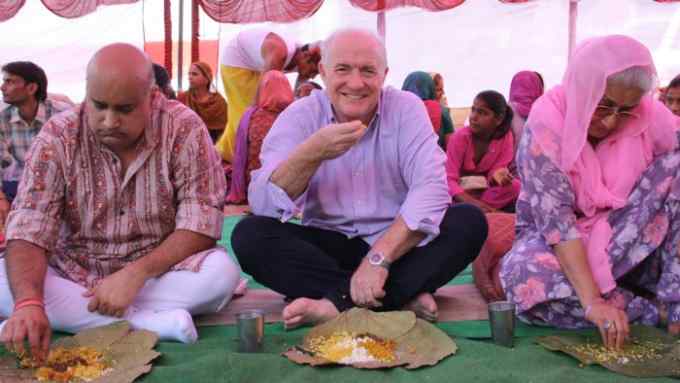
Comments